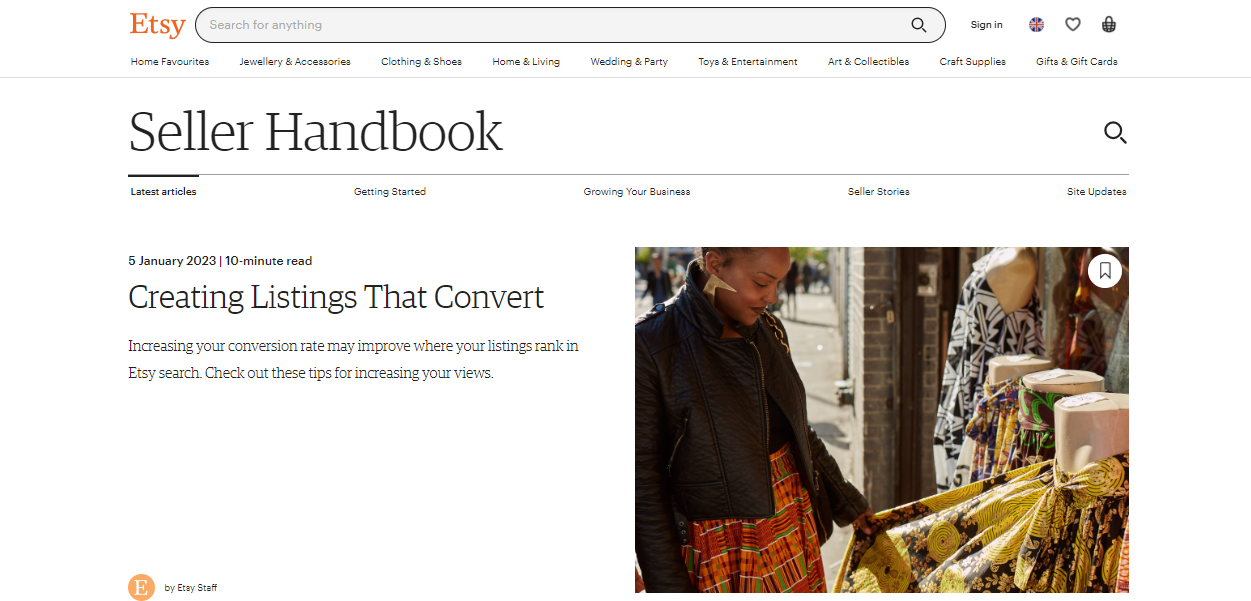[ad_1]

Are you considering setting up an Etsy shop and wondering how to become a successful Etsy seller? Or do you have a store already and want to fast-track it to success?
Either way, this article is going to help you out. With a sea of unfamiliar concepts, strategies, and terms, launching an Etsy store might feel like stepping into a foreign land.
But, with the right preparation and understanding, you can navigate this new terrain with ease and confidence.
Starting an Etsy shop involves more than just listing products online. It requires careful planning, goal setting, and a deep understanding of how the platform works.
From choosing the perfect shop name to setting attainable goals, each step plays a vital role in your journey to success.
To succeed on Etsy, you’ll need to gather essential elements, like high-quality product photos, correct item prices, and your bank’s routing number.
But, don’t worry if you feel overwhelmed. This post is going to detail everything you need to become a successful Etsy seller, so you can follow along and tick off each task as you go.
Overview of How to Become a Successful Etsy Seller
- Prepare and Plan Your Etsy Shop
- Set Up Your Etsy Shop the Right Way
- Guide on choosing an Etsy store name
- Setting specific and attainable goals for success
- Success stories from experienced sellers
- How to identify and use relevant keywords
- Tools and resources for keyword research
- Creating high-quality product listings
- How to market your Etsy store for huge traffic
- Tips to provide excellent customer service
Prepare and Plan
To become a successful Etsy seller, it’s important to follow the steps needed to launch and grow your shop.
Follow the Steps for Etsy Shop Success
Before you dive into setting up your Etsy shop, take some time to plan and prepare.
This will ensure a smooth and efficient launch, setting the foundation for your success.
Here are a few key steps to consider which we’ll go into further detail later in this article:
- Choose a Memorable Shop Name: Your shop name is your brand’s identity on Etsy. Take the time to brainstorm a unique and catchy name that reflects your products and resonates with your target audience. For tips on choosing the perfect name, check out the Etsy Seller Handbook.
- Customize Your Shop Home: Make a strong visual impact by customizing your shop’s appearance. Create an eye-catching shop icon, banner, and more to showcase your brand’s personality. Learn more in this article on how to customize your shop home.
- Craft Engaging Listings: Your product listings play a crucial role in attracting customers and driving sales. Follow these tips for creating Etsy listings that convert. Remember to optimize your listings with relevant keywords to enhance your visibility in Etsy search.
- Master Product Photography: High-quality product photos are essential in enticing potential buyers. Learn the art of capturing appealing product images in this article detailing the essential types of product photos needed on Etsy. Discover tips on lighting, shooting, editing, and more to make your products truly shine.
Set Up Your Etsy Store

If you already have your Etsy store set up, you can jump ahead to the ”setting specific and attainable goals” section.
As a complete beginner, you can read how to start an Etsy shop with no money which details all the steps you need to get started.
Further reading:
How to Become a Successful Etsy Seller: Choose a Unique Shop Name
When starting your journey as an Etsy seller, one of the first steps you’ll need to take is choosing a unique shop name.
Your shop name is not only a reflection of your brand, but it also plays a crucial role in attracting potential customers and creating a memorable identity.
In this section, we’ll explore some tips for selecting a great shop name and adding modifiers to make it even more distinctive.
Tips for Selecting a Unique Shop Name

- Reflect your brand: Your shop name should align with the products you sell and the overall vibe of your brand. Consider the style, theme, and target audience of your products, and try to capture that essence in your shop name. For example, if you specialize in handmade jewellery with a bohemian flair, a name like “BohoTreasures” or “FreeSpiritGems” could be fitting.
- Keep it simple: A clean and straightforward shop name is easier for customers to remember and search for. Avoid using complex or lengthy words that may confuse or discourage potential buyers. Short, catchy names tend to leave a lasting impression, so strive for simplicity while maintaining uniqueness.
- Research competitors: Before settling on a name, it’s essential to research other Etsy sellers in your niche. Take note of their shop names and analyze their strengths and weaknesses. This will help you identify what names are already in use and find inspiration for creating a distinctive name that stands out from the crowd.
- Consider SEO: While it’s important to choose a name that reflects your brand, it’s also beneficial to consider search engine optimization (SEO). Including relevant keywords related to your products in your shop name can improve your shop’s visibility in search results. For example, if you sell handmade candles, incorporating words like “candle” or “handmade” into your shop name can help potential customers find you more easily.
Adding Modifiers to Your Desired Name
Sometimes, the name you have in mind may already be taken by another Etsy seller.
In such cases, adding modifiers to your desired name can help you create a unique variation that is still representative of your brand.
Here are a few ideas for adding modifiers:
- Location-based modifiers: If your shop is geographically tied to a specific area, consider incorporating the name of your city or region into your shop name. This can help you attract local customers and create a sense of community. For example, if you sell handmade pottery in Portland, you could use a name like “PDXPottery” or “RoseCityClay.”
- Descriptive modifiers: Adding descriptive words that highlight key aspects of your products can make your shop name more interesting and informative. For instance, if you sell organic skincare products, words like “pure,” “natural,” or “botanical” can be used as modifiers to enhance your shop name.
- Niche-specific modifiers: If your products cater to a specific niche or target audience, incorporating niche-specific words into your shop name can help you attract the right customers. For example, if you specialize in vintage clothing, words like “retro,” “vintage,” or “nostalgic” can add depth and specificity to your shop name.
Remember, when adding modifiers to your desired name, it’s crucial to ensure that the new variation still aligns with your brand and conveys the essence of your products.
By thinking creatively and strategically, you can create a unique shop name that sets you apart from the competition.
Set Specific and Attainable Goals

Setting specific and attainable goals is a crucial step towards becoming a successful Etsy seller.
By having clear objectives in mind, you can stay focused, motivated, and measure your progress along the way.
Let’s explore the importance of setting realistic goals, breaking them down into manageable milestones, and learn from the success stories and tips shared by experienced sellers.
The Importance of Setting Realistic Goals
Setting realistic goals is essential because it provides you with a clear direction and ensures that your efforts are aligned with achievable outcomes.
When setting goals, it’s important to consider factors such as your available time, resources, and skills.
Having a well-defined objective will help you prioritize your tasks and make informed decisions about your Etsy business.
To set realistic goals, start by identifying what you want to achieve.
Do you want to increase your sales, expand your product line, or improve customer satisfaction?
Once you have a clear objective in mind, break it down into smaller, actionable steps.
This will make your goals more manageable and allow you to track your progress effectively.
Breaking Down Big Goals into Manageable Milestones
Breaking down big goals into smaller milestones is an effective strategy to stay motivated and avoid feeling overwhelmed.
By dividing your larger goals into manageable tasks, you can set achievable deadlines and celebrate each milestone as you reach it. This approach provides a sense of accomplishment and helps to maintain momentum throughout your journey as an Etsy seller.
For example, if your goal is to increase your sales by 50% within six months, break it down into monthly or weekly targets.
You can focus on increasing your sales by a certain percentage each month, and regularly assess your progress to make any necessary adjustments.
This incremental approach allows you to stay on track and make improvements as needed.
Success Stories and Tips from Experienced Sellers
Learning from successful Etsy sellers can provide valuable insights and inspiration for your own journey.
Many experienced sellers are generous with sharing their knowledge and tips, which can help you avoid common mistakes and accelerate your growth.
Seek out success stories and tips from seasoned Etsy sellers through forums, blogs, or podcasts.
Read more in this article detailing lessons from 10 successful Etsy shops.
Engage with the Etsy community and learn from their experiences.
Pay attention to the strategies they used to overcome challenges, how they set and achieved their goals, and the lessons they learned along the way.
By incorporating the wisdom of experienced sellers into your own approach, you can gain valuable perspectives and fine-tune your own strategies for success on Etsy.
Related websites for contextual information:
- Etsy Seller Handbook for comprehensive guidance on setting goals and achieving success on Etsy.
- Etsy Forums for engaging with the Etsy community and learning from experienced sellers.
How to Become a Successful Etsy Seller: Consider Keywords

In your Etsy seller journey, it is crucial to understand the importance of keywords and how to use them effectively.
Keywords are the words or phrases that potential customers use to search for products on Etsy or other search engines.
By using relevant keywords in your listings and shop descriptions, you can increase your visibility and attract more potential buyers.
Understanding the Importance of Keywords
Keywords play a significant role in improving the visibility of your Etsy shop.
When a customer searches for a specific product, the search engine algorithms scan the titles, tags, and descriptions of listings to identify the most relevant results.
By strategically using keywords, you can optimize your shop’s visibility and increase the chances of your products appearing in relevant search results.
How to Identify and Use Relevant Keywords
Identifying and using relevant keywords requires careful research and analysis.
Start by brainstorming a list of words and phrases that are relevant to your products. Put yourself in the shoes of potential buyers and think about what they might search for.
Consider using long-tail keywords, which are more specific and have lower competition.
Once you have a list of potential keywords, use free tools such as:
These tools provide valuable insights into popular search terms such as search volume and competition which will help you refine your keyword choices.
When incorporating keywords in your listings, make sure they appear naturally and flow with the overall content.
Avoid keyword stuffing, as it can negatively impact your shop’s visibility and user experience.
Aim for a balance between optimization and creating compelling, informative listings.
Read more in this Etsy Seller Handbook article: Keywords 101: Everything you need to Know
Creating High-Quality Product Listings

As a new Etsy seller, it is essential to create high-quality product listings that captivate potential buyers and compel them to make a purchase.
In this section, we will explore the key elements of crafting effective product listings on Etsy.
Writing Compelling and Descriptive Product Titles
The product title is the first thing that catches a buyer’s attention when browsing through Etsy.
Therefore, it is crucial to create compelling and descriptive titles that accurately represent your product.
A well-crafted title should not only be concise but also highlight the unique aspects of your item.
For example, instead of simply titling your listing as…
“Handmade Ceramic Mug,”
…consider something more captivating like…
“Elegant Handcrafted Ceramic Mug with Floral Motifs.”
By incorporating descriptive words and specific details, your title becomes more intriguing and helps potential buyers grasp the essence of your product at a glance.
Writing Detailed Product Descriptions
Once you have captured a buyer’s interest with an attention-grabbing title, it is crucial to provide a detailed product description that convinces them to make a purchase.
Your description should answer any questions they may have and showcase the value and quality of your item.
Start by describing:
- The materials used
- Their dimensions
- Any unique features or benefits
Be sure to highlight what sets your product apart from others and why it is worth buying.
Utilize persuasive language to evoke emotions and create a sense of desire in the buyer.
Remember, a well-crafted product description not only informs but also engages the reader.
By incorporating personal anecdotes or stories related to your product, you can establish a deeper connection with potential buyers and make your listing more memorable.
Utilizing High-Quality Product Photos

In the world of online shopping, visuals play a crucial role in attracting buyers.
Investing in high-quality product photography is essential for creating eye-catching listings on Etsy.
A picture is worth a thousand words, and in this case, it can make or break a sale.
Ensure that your product photos are clear, well-lit, and showcase your item from various angles.
Consider using props or models to demonstrate the functionality or scale of your product.
By providing potential buyers with a visual representation of your item’s quality and aesthetics, you increase their confidence in making a purchase.
In addition to high-resolution images, it is important to optimize your photos for web viewing.
Compress the file size and use descriptive file names and alt text to improve search engine visibility.
This will not only enhance the user experience but also improve your chances of appearing in relevant search results on Etsy and other search engines.
How to Become a Successful Etsy Seller: Promoting Your Etsy Shop
It’s not enough to just set up an Etsy store and hope buyers order your products.
While Etsy will do some promotion for you, it’s imperative that you make the effort to market your store yourself.
Utilizing Social Media Platforms for Promotion

In today’s digital age, social media has become a powerful tool for promoting businesses and reaching a wider audience.
As a new Etsy seller, harnessing the potential of social media can significantly boost your shop’s visibility and increase sales.
When it comes to promoting your Etsy shop on social media, it’s important to choose the right platforms that align with your target audience.
The best social platforms for promotion include:
These social sites are popular choices for Etsy sellers. Each platform offers unique features and attracts different demographics, so it’s essential to do some research and identify where your potential customers are most active.
Once you’ve identified the right platforms, it’s time to create engaging content that showcases your products and captures the attention of your audience.
Share high-quality images and videos of your products, along with compelling descriptions and relevant hashtags.
Be sure to include links to your Etsy shop in your social media profiles and posts to drive traffic directly to your listings.
To make the most of social media promotion, consistency is key. Regularly post updates about new products, promotions, and behind-the-scenes glimpses into your creative process.
Engage with your followers by responding to comments, answering questions, and participating in relevant discussions.
Building an active and loyal community on social media can lead to increased brand awareness and customer loyalty.
Etsy is not just a marketplace; it’s a vibrant community of artists, crafters, and entrepreneurs.
Engaging with this community can be a valuable strategy to promote your Etsy shop and establish yourself as a reputable seller.
Start by joining relevant Etsy forums that align with your niche or product category. Participate in discussions, offer advice, and contribute your expertise to build relationships with fellow Etsy sellers.
Collaborating and networking with other sellers can lead to cross-promotion opportunities, where you can promote each other’s products or feature them in curated gift guides.
Additionally, take advantage of Etsy’s community-focused features, such as the “Etsy Finds” and “Trending Items” sections, to showcase your products to a wider audience.
Submitting your items to these curated collections can increase their visibility and attract potential buyers.
Furthermore, consider participating in Etsy-sponsored events, such as online markets, virtual craft fairs, or collaborative sales. These events provide exposure and can help you connect with both new customers and fellow sellers.
Collaborating with Influencers and Bloggers

Influencer marketing has become a powerful tool for increasing brand awareness and driving sales.
Collaborating with influencers and bloggers who align with your niche can introduce your Etsy shop to their established audiences and expand your reach.
Start by researching influencers and bloggers who have a genuine interest in the products you sell.
Look for those with engaged audiences and a strong online presence. Reach out to them with a personalized pitch, highlighting how your products would resonate with their followers.
Offer them a free sample or a special discount code to incentivize them to feature your products.
When collaborating with influencers, it’s important to ensure authenticity and transparency. Encourage them to provide honest reviews and feedback about your products to maintain credibility.
This can build trust with their audience and increase the likelihood of generating sales.
Provide Excellent Customer Service
Customer service is a crucial aspect of running a successful Etsy shop.
In the competitive online marketplace, it’s essential to go above and beyond to exceed customer expectations.
In this section, we will discuss three key elements of providing excellent customer service:
Respond Promptly to Customer Inquiries
Promptly responding to customer inquiries is vital for building trust and establishing good customer relationships.
When a customer reaches out with a question or concern, make it a priority to respond as quickly as possible. Aim to reply within 24 hours, if not sooner.
This quick response time shows that you value their time and are dedicated to providing excellent service.
Handle Customer Feedback and Reviews
Customer feedback and reviews play a significant role in shaping your shop’s reputation and attracting new customers.
Embrace both positive and negative feedback as opportunities for growth and improvement.
When you receive positive feedback, take the time to express your gratitude and thank the customer for their support. This simple act of appreciation goes a long way in building customer loyalty.

Addressing negative feedback requires a different approach. Instead of getting defensive or dismissing their concerns, acknowledge the customer’s issue and thank them for bringing it to your attention.
Offer a sincere apology, if necessary, and provide a solution or compromise to rectify the situation.
By handling negative feedback with empathy and professionalism, you can turn an unhappy customer into a satisfied one.
To truly stand out as an Etsy seller, it’s important to go above and beyond what customers expect.
Consider adding small, thoughtful touches to your packaging or including a handwritten note expressing your gratitude. These personal touches make the customer feel valued and appreciated, increasing the likelihood of repeat purchases and positive word-of-mouth referrals.
Additionally, anticipate customer needs and address them proactively. For example, if you sell handmade jewellery, include care instructions or cleaning tips with each purchase.
This extra effort shows that you genuinely care about the customer’s experience and satisfaction.
Remember, providing excellent customer service is not a one-time effort but an ongoing commitment.
Continuously seeking ways to improve and exceed customer expectations will help your Etsy shop thrive and foster customer loyalty.
Final Thoughts on How to Become a Successful Etsy Seller
Now you know how to become a successful Etsy seller it’s down to you to go and put what you’ve learned into action.
By following the steps outlined in this article, you can set yourself up for success in the online marketplace.
But be aware, succeeding on Etsy is not an overnight thing. It takes months and even years of dedication to make life-changing money selling on Etsy.
However, if you are determined and persistent, it’s possible to turn your Etsy shop into a full-time career.
*Disclosure: I only recommend products I would use myself and all opinions expressed here are our own. This post may contain affiliate links that at no additional cost to you, I may earn a small commission.
Summary

Article Name
How to Become a Successful Etsy Seller: Tips and Tricks to Skyrocket Sales
Description
How to Become a Successful Etsy Seller: Tips and Tricks to Skyrocket Sales.
Author
Katie Lamb
Publisher Name
Remote Work Rebels
Publisher Logo

[ad_2]
Source link

